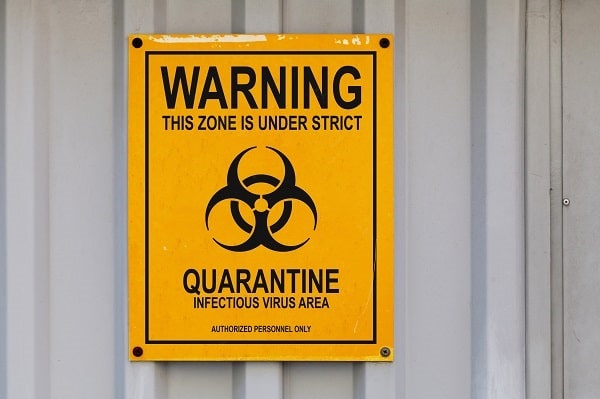The coronavirus, or COVID-19, has rocked the country and the entire world. It has changed the way we live and the way we work.
The number of cases and the number of deaths in the country, and around the globe, continue to grow. The first confirmed patient in the country, from the state of Washington, was diagnosed on Tuesday, January 21.

What is the Coronavirus?
This coronavirus, known as 2019 novel coronavirus or COVID-19, was first detected in Wuhan City, Hubei Province, China. Coronaviruses are a large classification of viruses that cause illnesses like the common cold and pneumonia. They are not generally dangerous and often can be treated with over-the-counter medications and rest. However, two well-known coronaviruses include Middle East respiratory syndrome (MERS) and severe acute respiratory syndrome (SARS). MERS was responsible for over 850 deaths between 2012 and 2015, starting in Saudi Arabia and spreading to other countries in the Middle East, as well as to Europe, Asia and Africa. The SARS outbreak in 2003 killed 774 people and spread to 26 countries.

Symptoms of a coronavirus resemble those of a respiratory infection, including:
- Fever
- Cough
- Sore throat
- Stuffy nose
- Shortness of breath and breathing difficulties
- Lower respiratory illnesses like bronchitis and pneumonia
Coronaviruses are known as “zoonotic,” meaning they are transmitted from animals to people. It was believed initially that individuals in Wuhan were exposed to COVID-19 from a seafood and meat market, but it’s now being spread from one human to another. One of the main concerns is that the virus is infectious before the symptoms show, which makes it more difficult to contain.

How to Prevent Coronavirus
COVID-19 was declared a global pandemic by the
World Health Organization (WHO) in mid-March 2020. WHO/Europe, in line with global guidance, recommends that all countries increase their level of preparedness and strengthen alert and response systems to identify, manage and care for new cases of COVID-19 and communicate risks.
Currently, a vaccine to protect people from human coronavirus is not available. As the situation continues to evolve in the U.S., the CDC and WHO will continue to monitor the situation and will work closely with state and local public health authorities. Their goal is to ensure potential cases are identified as early as possible and that those affected receive the best possible care.
As far as preventing the spread of this coronavirus, the CDC recommends the regular preventive actions taken to help spread other viruses, such as the
flu and the common cold, including:
- Washing hands frequently or using antibacterial hand sanitizer
- If you feel ill, stay home and avoid going to the workplace or other public places
- Cover your cough or sneeze with a tissue
- Keep surfaces and objects touched regularly clean and disinfected
- Avoid touching your nose, mouth and eyes with unwashed hands
- Stay away from people showing symptoms of upper respiratory illnesses as much as possible
“We should follow best practice at all times, especially with the threat of coronavirus," advised Melissa Burke, vice president of managed care and clinical at AmTrust. "It is essential for everyone to thoroughly wash their hands often with soap and water for at least 20 seconds, avoid close contact with people who are sick, avoid touching your eyes, nose, and mouth, stay home when they are sick, cover their cough or sneeze with a tissue, and clean or disinfect frequently touched surfaces. Coronavirus or even flu may affect our small businesses if they don’t have these policies in place."
If you suspect you have symptoms of COVID-19, it’s important to visit your doctor for tests. This is especially true if you’ve recently traveled overseas, or if you have been exposed to someone who recently traveled out of the country.
How U.S. Businesses Can Prepare for the Coronavirus Outbreak
The most important thing for businesses to keep in mind is to have a plan in place for these types of situations. Jeff Corder, vice president of loss control at AmTrust, says companies should “Prepare for the worst and expect the best, but above all, make sure your plans are in place. This is a potential threat to everyone. Currently, the risk is low, so now is time to review your plans and keep employees vigilant in health and hygiene.”

In most U.S. jurisdictions, employees whose jobs have greater potential exposure to the virus than the typical worker would have a greater likelihood of a compensable
workers’ compensation claim in the event of a positive coronavirus test. For instance, certain healthcare occupations would be one occupation with increased levels of exposure. However, each claim situation is based on individual merits and the differing laws of each state.
OSHA offers a variety of information regarding the coronavirus, including more prevention tips, FAQs and other resources on
their website.
Loss Control Resources from AmTrust Financial
AmTrust’s
Loss Control Department can help your business prepare for the outbreak of a pandemic like a coronavirus. Find employee
safety resources and helpful
streaming training videos on our website. For more information, please
contact us today.
This material is for informational purposes only and is not legal or business advice. Neither AmTrust Financial Services, Inc. nor any of its subsidiaries or affiliates represents or warrants that the information contained herein is appropriate or suitable for any specific business or legal purpose. Readers seeking resolution of specific questions should consult their business and/or legal advisors. Coverages may vary by location. Contact your local RSM for more information.